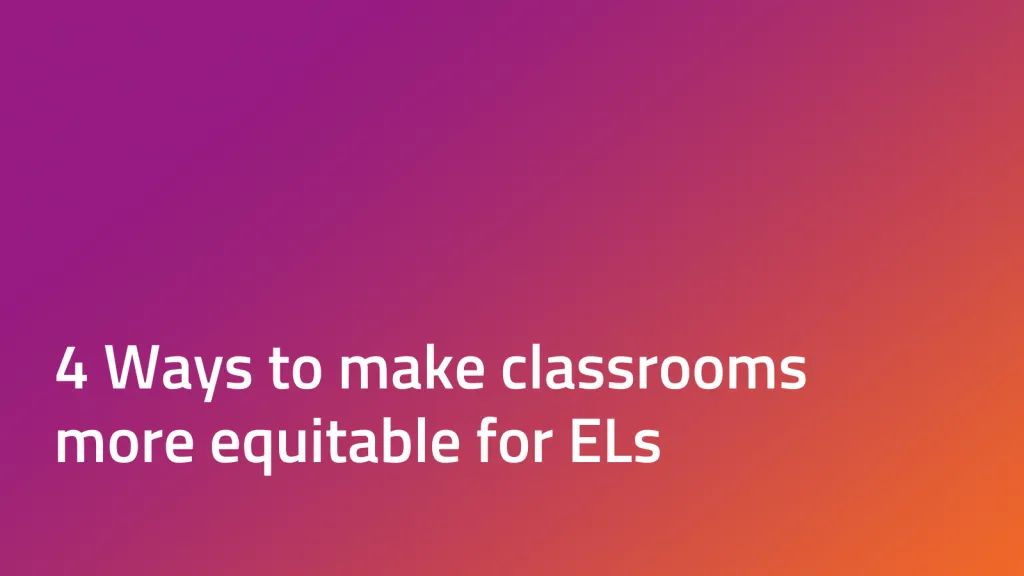4 Ways to Make Classrooms More Equitable for Multilingual Learners This Year


4 Ways to Make Classrooms More Equitable for Multilingual Learners This Year
The beginning of the school year is a critical time to discover the unique strengths and prior educational experiences our students carry with them. Given the shortage of data that educators may be confronting this year, it is particularly important to ensure all assessments are equitable for multilingual learners (MLs).
We invited author and WIDA co-founder and lead developer Dr. Margo Gottlieb to join us on the Highest Aspirations podcast to address how we might improve assessment and feedback practices for multilingual learners. We also discussed classroom techniques that bring equity and meaningful interactions to the forefront of instruction, and lower students' affective filter so they feel more empowered and confident in their learning.
We encourage you to listen to both parts of this series, and to check out Margo's new books, Classroom Assessment in Multiple Languages: A Handbook for Teachers and its companion Assessment in Multiple Languages: A Handbook for School and District Leaders, which served as the foundation for our conversation.
Here are four strategies we discuss to make classrooms more equitable for MLs:
1. Provide equitable opportunities for MLs to demonstrate knowledge in their home languages
From assessment to instruction, there is always a place for students’ home language. Margo emphasizes that even educators who themselves are not bilingual still have many opportunities to leverage their MLs’ multiple languages. Some suggestions she offers include:
- Provide opportunities for meaningful interaction with other MLs in their shared language.
- Encourage students to explore research questions in languages other than English.
- Allow MLs to demonstrate their learning in multiple languages through student portfolios.
2. Consider taking a fresh approach to assessing MLs
Margo introduces several new approaches to assessment in our conversation, which she covers more in her books. These updated methods shift the primary purpose of assessing away from outcomes and toward student learning:
- Assessment of learning is likely the approach educators are most familiar with. This involves some product of learning such as a project at the end of the unit and is led by the teacher with input from the student. The purpose of assessment of learning should be to highlight students’ growth and attainment of learning goals with consideration of multiple languages.
- Assessment for learning occurs in interactions between student and teacher, where they work together to co-construct learning targets and give/receive feedback or discuss progress toward these goals.
- Assessment as learning is owned and driven by multilingual learners, wherein students are called upon to be leaders of their own learning. This intrinsically-motivated approach to assessment can occur during or after interactions between multilingual learners where students are assessors and evaluators of their own and others' work.
3. Provide feedback that is constructive and productive
Feedback is critical for growth and development, but how it is given is a key component to success. Margo outlines some tactics educators can employ to ensure that feedback is given and received successfully.
Feedback should be…
- ...based on a previously agreed upon criteria. MLs must be involved in creating their goals and assessment so they understand and own what is expected of them.
- ...a cycle, not an event or destination. Feedback should be offered frequently along the educational journey so it results in continued action and growth.
- ...concrete. A happy/sad face may elicit a smile, but it falls short of providing meaningful information that students can act on.
4. Design systems to involve MLs in their education
It sounds simple, but finding the appropriate balance between structure and agency can be challenging. MLs should be involved in the entire assessment cycle - and strong relationships are at the core of this work. When we understand our students as individuals, we can better design and deploy assessments to optimize their learning. Margo stresses that MLs should be part of the conversation when deciding their learning goals and how they will know if they are on track to reach them.
We'd love to chat with you about how Ellevation can help support your multilingual learners. Reach out to us here.
Dr. Margo Gottlieb is co-founder and lead developer for WIDA at the Wisconsin Center for Education Research, University of Wisconsin-Madison. Starting her career as an elementary school teacher and bilingual coordinator, she served as the longstanding director of assessment and evaluation at the Illinois Resource Center. In addition, she has been a Fulbright Senior Specialist in Santiago, Chile and has keynoted, presented, and consulted in over 21 countries and almost every state in the U.S. In recent years, Margo’s scholarship has focused on designing language development standards frameworks, co-constructing linguistically and culturally sustainable curriculum, promoting student agency through assessment as, for, and of learning, and evaluating language education policy in K-12 settings.
Throughout her educational career Margo has been a staunch advocate and warrior for multilingual learners. You are welcome to contact her at margogottlieb@gmail.com or @margogottlieb.